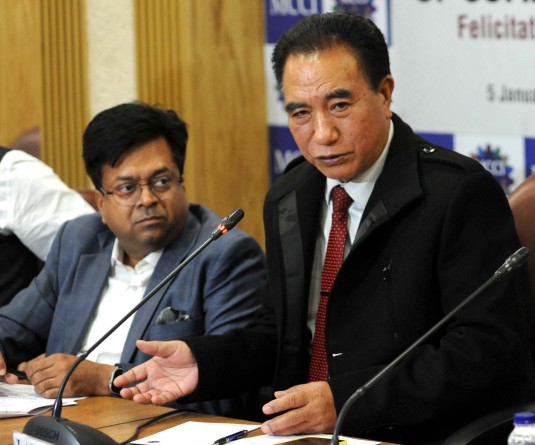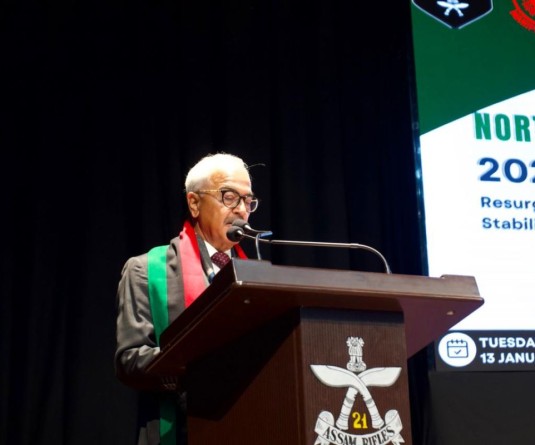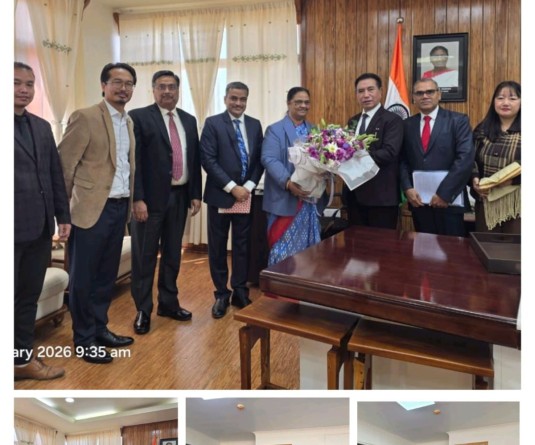
DIMAPUR, August 6 (TNN): The rising social menaces of human trafficking and child labour were thoroughly discussed and deliberated upon on Thursday at a state-level anti-human trafficking seminar-cum-workshop, organized by police.
The problem of human trafficking and child labour in Nagaland may not be very visible on the surface, but a deeper look reveals these two social menaces have already crept into Naga society. The recent cases of trafficked young boys and girls, who were lured by agents promising them job opportunities, being rescued from different parts of the country, speaks volumes about how fast and wide the trafficking racket has spread in the state. Also, the rising employment of minor boys and girls in Naga homes for doing domestic chores amounts to trafficking and child labour to some extent, as per law.
L Thechamo Lotha, ADG (Ops), who participated in the seminar, said poverty is the main cause of human trafficking, which, he said, is destroying the fabric of Naga society. He observed that most Nagas are lazy and want to make easy money, thus, they fall into the trap of unscrupulous people involved in trafficking.
The ADG added the Naga people are not being able to properly utilize the abundance of natural resources available here in Nagaland, which has led to long-drawn conflicts. He said no corporates are interested in investing money in Nagaland and creating employment opportunities, adding the government cannot afford to give employment to each and every person and unemployment has become a cause for serious concern.
Expressing concern over the rise in human trafficking case in recent times, the ADG said police alone cannot tackle the problem unless churches, NGOs, the social welfare department, juvenile department etc work together to curb the menace. He lamented there is lack of cooperation from all sections of the society in dealing with the menace.
Lotha also said trafficking thrives in the Naga society in many forms. In households, it exists in the form of child labour, with minor boys and girls from underprivileged homes in rural areas being employed as domestic help. These children lose out on their right to education as they are not allowed to go to school. They are also often not paid and fed properly and are engaged in household work, which is child labour.
"We are violating the Child Labour Act and also engaging in human trafficking," he said, urging everyone to think seriously about these issues.
I Toshitsungba Aier, DIG (range) explained in detail the different forms of human trafficking and the laws in place to deal with the problem. In the state's context, he said the Naga society is not free from prostitution and disclosed that there are nearly 1,000 commercial sex workers in Dimapur alone. These sex workers are operating underground, because they are outcast by the society and harassed by police, pressure groups and NGOs. These women are treated as offenders and not as victims whenever they are caught by police or by civil society, he added.
Aier also recalled recent incidents of Naga girls being trafficked to other Indian cities and forced into the flesh trade. He said most of the victims, from both rural and urban backgrounds, were promised better employment, training etc but finally landed in brothels in Bangalore, Pune, Chennai, Mumbai, Delhi, Kolkata and other cities.
The DIG said that the initial recruitment of these innocent victims is done with the help of local agents. He explained the modus operandi: traffickers publish advertisements in local papers for employment and training; then they 'recruit' young girls assuring them employment and handsome salaries in cities outside Nagaland but, more often than not, the girls are forced into prostitution.
In fact, some agents also use the cover of Christian 'missionaries' and contact youths through churches. He said some such fake 'missionaries' have been busted.
The DIG further disclosed that 106 persons were reported missing in the state from January to May 2011 and the number of persons traced were only 36. The number of human trafficking cases reported in Nagaland between 2005 and June 2011 is 24.
The problem of human trafficking and child labour in Nagaland may not be very visible on the surface, but a deeper look reveals these two social menaces have already crept into Naga society. The recent cases of trafficked young boys and girls, who were lured by agents promising them job opportunities, being rescued from different parts of the country, speaks volumes about how fast and wide the trafficking racket has spread in the state. Also, the rising employment of minor boys and girls in Naga homes for doing domestic chores amounts to trafficking and child labour to some extent, as per law.
L Thechamo Lotha, ADG (Ops), who participated in the seminar, said poverty is the main cause of human trafficking, which, he said, is destroying the fabric of Naga society. He observed that most Nagas are lazy and want to make easy money, thus, they fall into the trap of unscrupulous people involved in trafficking.
The ADG added the Naga people are not being able to properly utilize the abundance of natural resources available here in Nagaland, which has led to long-drawn conflicts. He said no corporates are interested in investing money in Nagaland and creating employment opportunities, adding the government cannot afford to give employment to each and every person and unemployment has become a cause for serious concern.
Expressing concern over the rise in human trafficking case in recent times, the ADG said police alone cannot tackle the problem unless churches, NGOs, the social welfare department, juvenile department etc work together to curb the menace. He lamented there is lack of cooperation from all sections of the society in dealing with the menace.
Lotha also said trafficking thrives in the Naga society in many forms. In households, it exists in the form of child labour, with minor boys and girls from underprivileged homes in rural areas being employed as domestic help. These children lose out on their right to education as they are not allowed to go to school. They are also often not paid and fed properly and are engaged in household work, which is child labour.
"We are violating the Child Labour Act and also engaging in human trafficking," he said, urging everyone to think seriously about these issues.
I Toshitsungba Aier, DIG (range) explained in detail the different forms of human trafficking and the laws in place to deal with the problem. In the state's context, he said the Naga society is not free from prostitution and disclosed that there are nearly 1,000 commercial sex workers in Dimapur alone. These sex workers are operating underground, because they are outcast by the society and harassed by police, pressure groups and NGOs. These women are treated as offenders and not as victims whenever they are caught by police or by civil society, he added.
Aier also recalled recent incidents of Naga girls being trafficked to other Indian cities and forced into the flesh trade. He said most of the victims, from both rural and urban backgrounds, were promised better employment, training etc but finally landed in brothels in Bangalore, Pune, Chennai, Mumbai, Delhi, Kolkata and other cities.
The DIG said that the initial recruitment of these innocent victims is done with the help of local agents. He explained the modus operandi: traffickers publish advertisements in local papers for employment and training; then they 'recruit' young girls assuring them employment and handsome salaries in cities outside Nagaland but, more often than not, the girls are forced into prostitution.
In fact, some agents also use the cover of Christian 'missionaries' and contact youths through churches. He said some such fake 'missionaries' have been busted.
The DIG further disclosed that 106 persons were reported missing in the state from January to May 2011 and the number of persons traced were only 36. The number of human trafficking cases reported in Nagaland between 2005 and June 2011 is 24.






